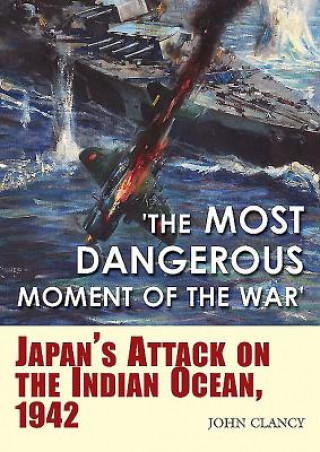
Kód: 09243203
Most Dangerous Moment of the War
Autor John Clancy
In early April 1942, a little-known chapter of World War II took place, said by Sir Winston Churchill to be 'the most dangerous moment of the war' when the Japanese made their only major offensive westwards into the Indian Ocean. ... celý popis
- Jazyk:
 Angličtina
Angličtina - Vazba: Pevná
- Počet stran: 208
Nakladatelství: Casemate Publishers, 2015
- Více informací o knize

Mohlo by se vám také líbit
Informovat o naskladnění knihy
Zadejte do formuláře e-mailovou adresu a jakmile knihu naskladníme, zašleme vám o tom zprávu. Pohlídáme vše za vás.
Více informací o knize Most Dangerous Moment of the War
 Anotace knihy
Anotace knihy
In early April 1942, a little-known chapter of World War II took place, said by Sir Winston Churchill to be 'the most dangerous moment of the war' when the Japanese made their only major offensive westwards into the Indian Ocean. Historian, Sir Arthur Bryant said, 'A Japanese naval victory in April 1942 would have given Japan total control of the Indian Ocean, isolated the Middle East and brought down the Churchill government'.War in the Far East had erupted with the attack on Pearl Harbour on 7th December 1941 and it appeared that the British naval bases at Ceylon would be next. The Japanese had a vast new coastline to defend, stretching from New Guinea to Northern Burma, and having destroyed the American fleet at Pearl Harbour, could not accept the threat of the British Eastern Fleet based at Ceylon. Occupation of Ceylon was vital as it was a springboard into India. Without control of Ceylon, essential convoys from India to Europe and the Western Desert would be in constant danger and Allied naval strength in the Far East was at a dangerously low level. With the Japanese forces seeming unstoppable, the Indian Ocean lay open and undefended. So far the Japanese had suffered no significant losses and the offensive continued unabated as they steamed westward, unopposed. It was generally felt Ceylon would be next to fall. It was a situation that could not be allowed to happen but the question on everyone's lips was how soon would Japan take advantage of this strategic situation. After the war Churchill acknowledged that the potential disaster at Ceylon had been averted by the brave actions of one pilot, Squadron Leader L.J. Birchall who in flying his Catalina flying boat on a regular patrol, spotted the Japanese warships massing some 350 miles from Ceylon. He was spotted by the Japanese whose aircraft shot him down but before so doing, Birchall sent a brief radio message back to his base. This gave the island's defence forces sufficient time to prepare for the attack and to disperse the British fleet out to sea. Churchill acknowledged this pilot had made one of the most important single contributions to our victory.John Clancy tells the story of the events of this dramatic but little known episode in which a major catastrophe was only narrowly averted, but in which over a thousand mainly British lives were lost, including the sinking of HMS Cornwall and HMS Dorsetshire.
 Parametry knihy
Parametry knihy
Zařazení knihy Knihy v angličtině Humanities History Regional & national history
- Plný název: Most Dangerous Moment of the War
- Podnázev: Japan's Attack on the Indian Ocean, 1942
- Autor: John Clancy
- Jazyk:
 Angličtina
Angličtina - Vazba: Pevná
- Počet stran: 208
- EAN: 9781612003344
- ISBN: 1612003346
- ID: 09243203
- Nakladatelství: Casemate Publishers
- Hmotnost: 460 g
- Rozměry: 238 × 160 × 21 mm
- Datum vydání: 13. October 2015
Oblíbené z jiného soudku
-

Hundred Years' War on Palestine
356 Kč -

Ethnic Cleansing of Palestine
389 Kč -

History of Japan
402 Kč -

Ten Myths About Israel
353 Kč -

Strange Death of Europe
444 Kč -

Decline and Fall of the Roman Empire
143 Kč -

Secret History
303 Kč -

God's Playground A History of Poland
1699 Kč -

Mayflower
401 Kč -

How to be a Victorian
303 Kč -

Plantagenets
356 Kč -

General's Son
423 Kč -

Iran: A Very Short Introduction
273 Kč -

Temples of Karnak
3798 Kč -

Twenty Years A-Growing
249 Kč -

Cuneiform
276 Kč -

History of Witchcraft in England from 1558 to 1718
432 Kč -

China in Africa
906 Kč -

Bohemian Paris
415 Kč -

Islandman
276 Kč -

Lancaster And York
410 Kč -

Alexiad
439 Kč -

Inside Hitler's Greece
516 Kč -

Modern France: A Very Short Introduction
273 Kč -

Diana: Her True Story - In Her Own Words
303 Kč -

The Fourth Turning
476 Kč -

The Oxford History of Ancient Egypt
383 Kč -

Churchill: The Power of Words
384 Kč -

Palestine
574 Kč -

Korean History in Maps
705 Kč -

Great Gatsby (Wisehouse Classics Edition)
405 Kč -

Viking Way
1267 Kč -

The Thirteenth Tribe
309 Kč -

My Promised Land
389 Kč -

Vanished Kingdoms
542 Kč -

Age Of Revolution
410 Kč -

Life and Death of Anne Boleyn
584 Kč -

Coming of the Third Reich
415 Kč -

Children of Ash and Elm
487 Kč -

Europe Between the Oceans
798 Kč -

Socialism Betrayed
480 Kč -

303 Squadron
463 Kč -

Ancient Celts, Second Edition
655 Kč -

Dancing in the Glory of Monsters
400 Kč -

Battle of Britain: Luftwaffe Blitz (Images of War)
656 Kč -

Age of Confucian Rule
753 Kč -

Beyond Band of Brothers
410 Kč -

Benjamin Franklin
410 Kč -

On China
487 Kč
Osobní odběr Praha, Brno a 12903 dalších
Copyright ©2008-24 nejlevnejsi-knihy.cz Všechna práva vyhrazenaSoukromíCookies




 Vrácení do měsíce
Vrácení do měsíce 571 999 099 (8-15.30h)
571 999 099 (8-15.30h)